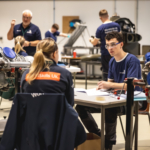I travelled to Kazan for the Worldskills competition 2019 in anticipation of understanding the emphasis and value that other nations place on skills development and the benefit of competitions as a tool to inspire young people to engage in vocational training.
As I met up with the official British party of competitors, team leaders and officials, I was struck by the enthusiasm and pride of this group of young people, set to represent their country on the international stage. Some had never been abroad before and were obviously both excited and apprehensive about competing against the best in the world in their chosen discipline. However, others were on hand to reassure and offer companionship and a real team spirit was evident.
To witness the competition would be a worthwhile trip in itself, but the event also played host to an international conference and I was also part of a group that would engage in learning discussions with similar skills practitioners from various international groups represented at the competition.
The facilities for the competition in Kazan were outstanding – a custom built Expo site. All training managers that I spoke to, who had experience of previous competitions, agreed that it was the best prepared event to date and that the Russian hosts had left no stone unturned in an effort to produce the best possible environment to compete and showcase the best of vocational skills.
The opening theme of the conference was “knowledge through experience” and the need to focus on doing and making, rather than relying entirely on theory; an interesting and necessary concept, particularly around the emerging digital skills and green technology.
The engagement I had with a group of construction industry experts from the UK, provided me with the opportunity to meet with similar practitioners from various nations represented at the competition, including Russia, Denmark, Sweden, Germany, Hong Kong, France and our constituent UK countries. When meeting individually with these groups, key themes emerged around funding, skills development, vocational pathways, frameworks and future skills needs.
Most observers agreed on the need for greater emphasis on the value of vocational skills as an aid to productivity and economic development. Some nations felt that they were better supported than others as far as investment for employers to provide apprenticeships through funding available from central or local government. The need for joined up frameworks and pathways was evident, and again, examples of where this works best seemed to be from simple, clutter free vocational systems. It was essential to enthuse young people from an early age if real skill sets are to be developed and valued.
The competition itself was an outstanding showcase of the very best of vocational skills. I took time to marvel at the range of skills on display and was struck by the emphasis placed by many of the nations on the need to embed Worldskills training in their mainstream vocational systems. The Russians, for example, are clear that they see the Worldskills framework as the main cornerstone in their vocational curriculum as it provides an international benchmark, constantly updated through sharing best practice. Other countries have dedicated specialists who work with their competitors almost on a full time basis to reach the standard required to compete and win at this level.
So what have I learned?
Vocational Skills are essential for the modern world.
Our young people have the ability to compete and win at this level given the chance.
Other nations are placing a greater emphasis on skills development as an economic driver and they are using competitions as a vehicle to drive up standards and engage more young people.
In our country, too much reliance is placed on enthusiastic, willing advocates to deliver training for competitions. They do a fantastic job but over reliance on them provides sporadic, fragmented success within pockets of our country. We need a more uniform, joined up, properly funded approach to skills competitions.
It’s not just about winning medals or competing in competitions – that is merely the top of the pyramid. The real benefit to the system are the many at the other end of the pyramid who are engaged in quality skills training and are aiming for the top. Success at competitions provides them with motivation and the validation of the level of their development.
The strapline for KAZAN 2019 was “Skills for Change”
Perhaps in the UK we need to Change for Skills!


